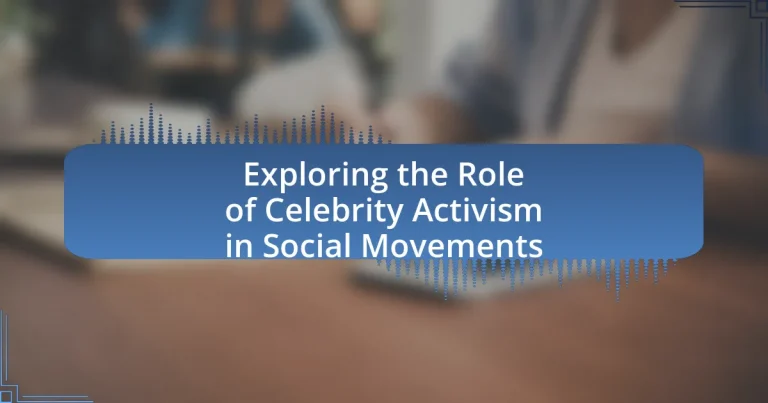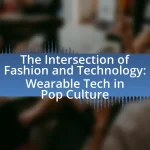Celebrity activism is a powerful force in social movements, utilizing the visibility and influence of public figures to raise awareness and mobilize support for various causes. This article explores the methods celebrities use to engage in activism, such as social media advocacy and partnerships with non-profits, and examines how their endorsements can enhance the credibility of social movements. It also addresses the challenges faced by celebrity activists, including public scrutiny and accusations of inauthenticity, while highlighting successful examples and strategies that maximize their impact. The significance of celebrity activism in contemporary society is underscored by its ability to drive public discourse and foster tangible action for social change.
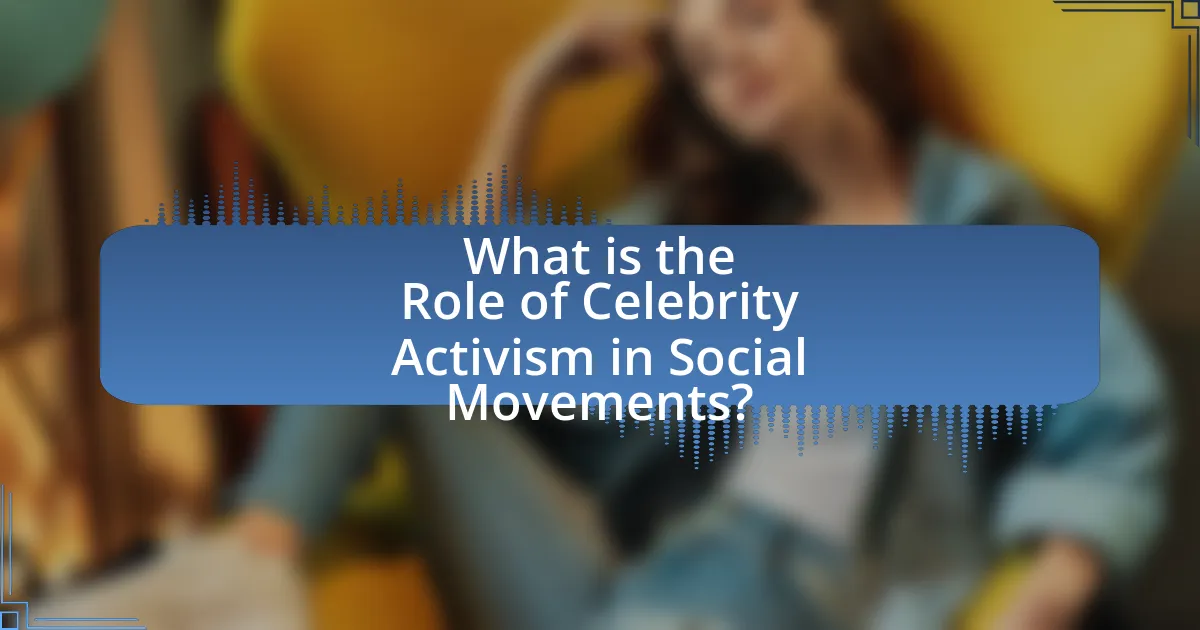
What is the Role of Celebrity Activism in Social Movements?
Celebrity activism plays a significant role in social movements by leveraging the visibility and influence of public figures to raise awareness and mobilize support for various causes. Celebrities often use their platforms to highlight social issues, attract media attention, and engage their fan base, which can lead to increased public discourse and action. For instance, during the Black Lives Matter movement, celebrities like Beyoncé and Taylor Swift used their social media to advocate for racial justice, resulting in heightened awareness and participation in protests. Research indicates that celebrity endorsements can enhance the credibility of social movements, as seen in studies showing that campaigns featuring celebrities often achieve higher engagement rates and donations compared to those without.
How do celebrities influence social movements?
Celebrities influence social movements by leveraging their visibility and platforms to raise awareness and mobilize support for various causes. Their large followings on social media enable them to disseminate information rapidly, often reaching millions in a short time. For instance, during the Black Lives Matter movement, celebrities like Beyoncé and LeBron James used their influence to amplify messages of racial justice, leading to increased public engagement and donations to related organizations. Additionally, research indicates that celebrity endorsements can significantly enhance the credibility of a cause, as seen in campaigns like the Ice Bucket Challenge, which raised over $115 million for ALS research in 2014, largely due to celebrity participation.
What methods do celebrities use to engage in activism?
Celebrities engage in activism through various methods, including social media advocacy, public speaking, fundraising, and partnerships with non-profit organizations. Social media platforms allow celebrities to reach large audiences quickly, raising awareness about social issues and mobilizing their followers for action. For instance, during the Black Lives Matter movement, many celebrities used their platforms to share educational resources and promote protests. Public speaking at events or on talk shows enables celebrities to articulate their causes and inspire others to join. Fundraising efforts, such as benefit concerts or charity auctions, directly support specific initiatives, exemplified by events like the Global Citizen Festival, which raises funds for global poverty alleviation. Additionally, partnerships with established non-profits, such as Leonardo DiCaprio’s collaboration with the World Wildlife Fund, amplify their impact by leveraging organizational resources and expertise. These methods demonstrate how celebrities can effectively influence social movements and drive change.
How does celebrity endorsement impact public perception?
Celebrity endorsement significantly influences public perception by enhancing brand credibility and shaping consumer attitudes. Research indicates that consumers often associate the qualities of a celebrity, such as trustworthiness and attractiveness, with the endorsed product or cause, leading to increased positive perceptions. For instance, a study published in the Journal of Advertising Research found that 70% of consumers are more likely to trust a brand when endorsed by a celebrity they admire. This effect is particularly pronounced in social movements, where celebrities can amplify awareness and legitimacy, thereby mobilizing public support and engagement.
Why is celebrity activism significant in contemporary society?
Celebrity activism is significant in contemporary society because it leverages the influence and visibility of public figures to raise awareness and drive social change. Celebrities often have large platforms that can reach millions, making their advocacy effective in mobilizing public opinion and resources for various causes. For instance, the #MeToo movement gained substantial traction partly due to high-profile endorsements from celebrities, which helped to bring issues of sexual harassment and assault into mainstream discourse. Additionally, research indicates that celebrity involvement can increase donations and volunteerism for charitable organizations, as seen in campaigns led by figures like Beyoncé and Leonardo DiCaprio. This demonstrates that celebrity activism not only amplifies important social issues but also fosters tangible action and support within communities.
What historical context has shaped celebrity activism?
Celebrity activism has been shaped by significant historical events and cultural shifts, particularly during the 20th century. The civil rights movement in the 1960s, for instance, saw prominent figures like Harry Belafonte and Marlon Brando using their platforms to advocate for racial equality, demonstrating how celebrities can influence public opinion and policy. Additionally, the rise of mass media and the internet has amplified celebrity voices, allowing them to mobilize support for various causes, such as environmentalism and humanitarian efforts. The AIDS crisis in the 1980s further highlighted the role of celebrities like Elizabeth Taylor and Magic Johnson in raising awareness and funding for research, showcasing the impact of personal narratives in activism. These historical contexts illustrate how celebrity activism has evolved, reflecting societal values and leveraging media to effect change.
How does celebrity activism differ from traditional activism?
Celebrity activism differs from traditional activism primarily in its reliance on the celebrity’s public persona and media influence to raise awareness and mobilize support. While traditional activism often involves grassroots organizing and community engagement, celebrity activism leverages fame to reach broader audiences quickly, as seen in campaigns like the Ice Bucket Challenge, which raised over $115 million for ALS research in a short period. This approach can lead to increased visibility for causes but may lack the depth of engagement found in traditional activism, where sustained efforts often build community resilience and long-term change.
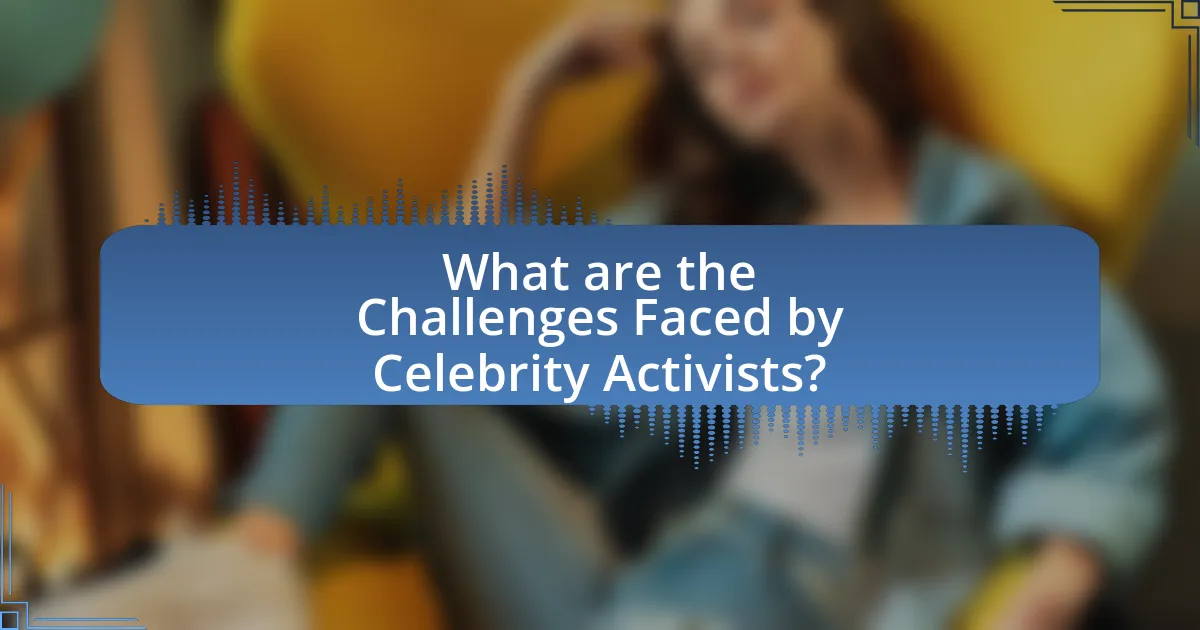
What are the Challenges Faced by Celebrity Activists?
Celebrity activists face several challenges, including public scrutiny, backlash from opposing groups, and the risk of being perceived as inauthentic. Public scrutiny often leads to intense media coverage that can distort their messages or personal lives, making it difficult for them to maintain focus on their causes. Backlash from opposing groups can manifest in social media campaigns or public protests, undermining their efforts and creating a hostile environment. Additionally, the perception of inauthenticity arises when celebrities are viewed as leveraging social issues for personal gain or publicity, which can alienate supporters and diminish the impact of their activism. These challenges can hinder the effectiveness of celebrity activists in promoting social change.
What criticisms do celebrity activists encounter?
Celebrity activists encounter criticisms primarily related to perceived insincerity and lack of genuine commitment to the causes they advocate. Critics argue that celebrities often engage in activism for publicity or personal branding rather than a true desire to effect change. For instance, a study published in the Journal of Communication found that celebrity involvement in social issues can sometimes overshadow grassroots movements, leading to accusations of “performative activism,” where the focus is more on the celebrity’s image than on substantive action. Additionally, celebrity activists may face backlash for their privilege, with detractors claiming they are out of touch with the realities faced by those they aim to help, which can undermine their credibility and the effectiveness of their advocacy efforts.
How do accusations of inauthenticity affect their efforts?
Accusations of inauthenticity significantly undermine the efforts of celebrity activists by eroding public trust and diminishing their credibility. When celebrities are perceived as insincere or opportunistic, their messages may be dismissed, leading to reduced engagement from their audience and potential supporters. Research indicates that authenticity is crucial in activism; for instance, a study published in the Journal of Communication found that perceived authenticity positively correlates with audience support and participation in social movements. Thus, when celebrities face accusations of inauthenticity, it can lead to a backlash that hampers their ability to mobilize resources and influence public opinion effectively.
What role does media scrutiny play in their activism?
Media scrutiny significantly amplifies the impact of celebrity activism by increasing visibility and accountability. When celebrities engage in social movements, media coverage can elevate their messages, reaching broader audiences and fostering public discourse. For instance, the media’s focus on celebrities like Leonardo DiCaprio during climate change campaigns has led to increased awareness and support for environmental initiatives, as evidenced by the rise in donations to related organizations following his public appearances and statements. This scrutiny not only highlights the issues at hand but also pressures both the celebrities and the organizations they support to maintain authenticity and commitment to their causes.
How do personal interests impact celebrity activism?
Personal interests significantly shape celebrity activism by aligning their advocacy efforts with causes that resonate with their values and experiences. For instance, celebrities often leverage their platforms to promote issues such as mental health, environmental sustainability, or social justice, reflecting their personal journeys or passions. A notable example is actress Emma Watson, who has been a prominent advocate for gender equality, influenced by her own experiences and beliefs about feminism. This alignment not only enhances the authenticity of their activism but also engages their audience more effectively, as fans are often drawn to causes that reflect the personal narratives of their idols.
What are the potential conflicts of interest for celebrities?
Celebrities may face potential conflicts of interest primarily due to their dual roles as public figures and business entities. These conflicts can arise when a celebrity’s personal brand or endorsements clash with the causes they advocate for, leading to questions about their authenticity and motivations. For instance, a celebrity promoting environmental sustainability while endorsing a fossil fuel company exemplifies this conflict. Additionally, financial incentives from sponsorships or partnerships can compromise their commitment to social causes, as seen when celebrities prioritize lucrative deals over genuine activism. Such situations can undermine public trust and dilute the impact of their advocacy efforts.
How can celebrity activism be perceived as self-serving?
Celebrity activism can be perceived as self-serving when it appears to prioritize personal branding over genuine social impact. This perception arises from instances where celebrities engage in activism primarily to enhance their public image or to gain media attention, rather than to effect meaningful change. For example, a study by the University of Southern California found that celebrities often receive more media coverage for their philanthropic efforts than traditional activists, which can lead to questions about their motivations. Additionally, when celebrities promote causes that align with their personal interests or financial investments, it can further reinforce the notion that their activism serves their own agendas rather than the needs of the communities they aim to support.
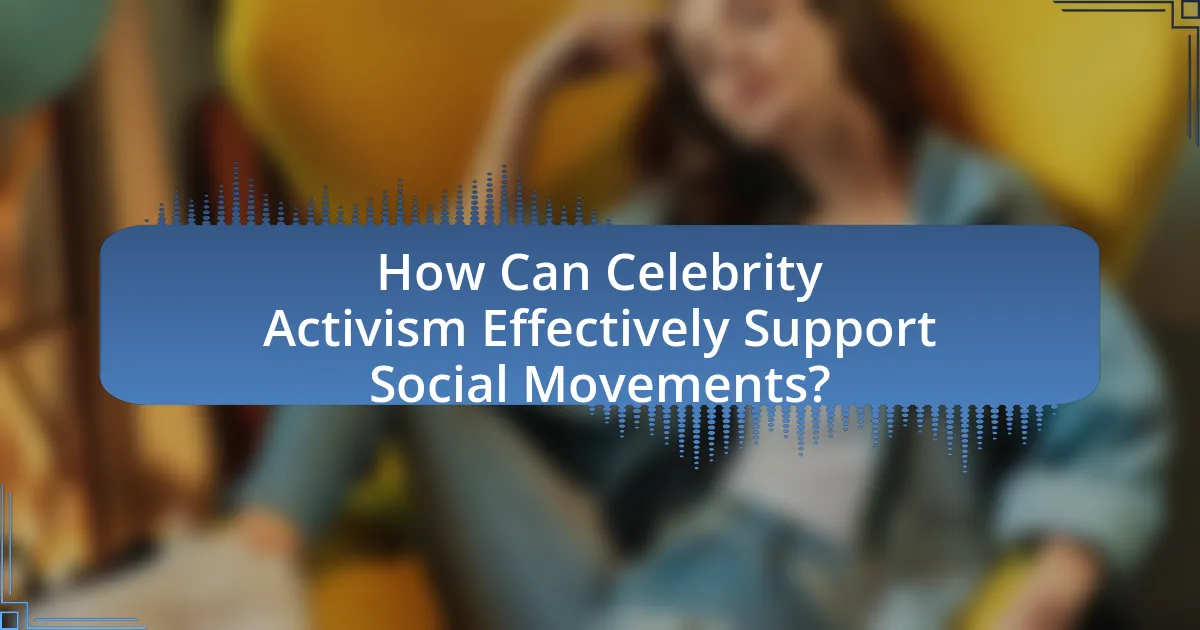
How Can Celebrity Activism Effectively Support Social Movements?
Celebrity activism can effectively support social movements by leveraging their influence to raise awareness, mobilize resources, and amplify marginalized voices. For instance, celebrities like Leonardo DiCaprio have utilized their platforms to advocate for environmental issues, significantly increasing public engagement and funding for climate initiatives. Research indicates that celebrity endorsements can enhance the visibility of social causes, as seen in the 2018 “March for Our Lives” campaign, where high-profile figures attracted millions of participants and extensive media coverage. This demonstrates that when celebrities actively participate in social movements, they can drive substantial public interest and action, thereby reinforcing the movement’s goals and objectives.
What strategies can enhance the impact of celebrity activism?
To enhance the impact of celebrity activism, leveraging social media platforms effectively is crucial. Social media allows celebrities to reach vast audiences instantly, facilitating engagement and mobilization around social issues. For instance, a study by the Pew Research Center found that 69% of adults in the U.S. use social media, making it a powerful tool for spreading awareness and rallying support. Additionally, forming strategic partnerships with established organizations can amplify the message and provide credibility, as seen when celebrities collaborate with NGOs to address specific causes. Furthermore, consistent and authentic engagement, rather than one-off campaigns, fosters trust and long-term commitment from followers, which is essential for sustained impact.
How can celebrities collaborate with grassroots organizations?
Celebrities can collaborate with grassroots organizations by leveraging their platforms to raise awareness, mobilize resources, and amplify the voices of local communities. For instance, celebrities can participate in fundraising events, use social media to promote grassroots initiatives, and engage in direct advocacy efforts that align with the organization’s mission. A notable example is when actor Leonardo DiCaprio partnered with the grassroots organization Earth Alliance to address climate change, effectively using his influence to garner support and funding for environmental projects. This collaboration not only enhances visibility for the grassroots cause but also attracts additional supporters and resources, demonstrating the impactful synergy between celebrity activism and grassroots movements.
What role does social media play in amplifying their message?
Social media plays a crucial role in amplifying the messages of celebrity activists by providing a platform for rapid dissemination and engagement. Through platforms like Twitter, Instagram, and Facebook, celebrities can reach millions of followers instantly, allowing their advocacy efforts to gain visibility and traction. For instance, a study by the Pew Research Center found that 69% of adults in the U.S. use social media, making it an effective tool for spreading awareness about social issues. Additionally, social media facilitates direct interaction between celebrities and their audiences, fostering a sense of community and encouraging collective action. This dynamic enhances the impact of their messages, as seen in campaigns like #MeToo and #BlackLivesMatter, which gained momentum through social media engagement.
What are some successful examples of celebrity activism?
Successful examples of celebrity activism include Leonardo DiCaprio’s environmental advocacy, which has raised millions for climate change initiatives through his foundation and documentaries. Another notable example is Emma Watson’s work for gender equality as a UN Women Goodwill Ambassador, where she launched the HeForShe campaign, engaging men in the fight for women’s rights and reaching millions globally. Additionally, Colin Kaepernick’s protest against racial injustice through kneeling during the national anthem sparked nationwide discussions and movements for social justice, influencing athletes and activists alike. These instances demonstrate how celebrities can leverage their platforms to effect significant social change.
How did specific celebrities contribute to notable social movements?
Celebrities have significantly contributed to notable social movements by leveraging their platforms to raise awareness and mobilize support. For instance, Beyoncé’s involvement in the Black Lives Matter movement has included performances that highlight racial injustice, such as her Super Bowl halftime show in 2016, which paid homage to the Black Panthers and addressed police brutality. Similarly, Emma Watson’s advocacy for gender equality through the HeForShe campaign has mobilized men and women globally to support women’s rights, evidenced by her speech at the United Nations in 2014, which garnered widespread media attention and engagement. Additionally, Leonardo DiCaprio has been a prominent advocate for environmental issues, using his Oscar acceptance speech in 2016 to emphasize climate change and its impact, which has led to increased public discourse and action on environmental policies. These examples illustrate how celebrities can effectively influence social movements through visibility, advocacy, and public engagement.
What lessons can be learned from successful celebrity activism?
Successful celebrity activism demonstrates the power of visibility and influence in driving social change. Celebrities can amplify important issues, mobilize public support, and attract media attention, which can lead to significant outcomes. For instance, the #MeToo movement gained momentum partly due to high-profile endorsements from celebrities like Alyssa Milano and Oprah Winfrey, which helped raise awareness about sexual harassment and assault. Additionally, research indicates that celebrity involvement can increase donations and volunteerism for causes, as seen with the success of Live Aid in 1985, which raised over $125 million for famine relief in Ethiopia. These examples illustrate that effective celebrity activism combines personal passion with strategic communication to engage audiences and foster collective action.
What practical tips can celebrities follow to maximize their activism impact?
Celebrities can maximize their activism impact by leveraging their platforms to raise awareness, engage in meaningful partnerships, and maintain authenticity. Utilizing social media effectively allows celebrities to reach large audiences quickly; for instance, a single tweet or Instagram post can garner millions of views, amplifying their message. Collaborating with established organizations ensures that their efforts are grounded in expertise and can lead to more significant outcomes, as seen with celebrities partnering with nonprofits like UNICEF or the Red Cross. Additionally, maintaining authenticity by sharing personal stories or experiences related to the cause fosters a deeper connection with their audience, which has been shown to increase engagement and support for social movements.
